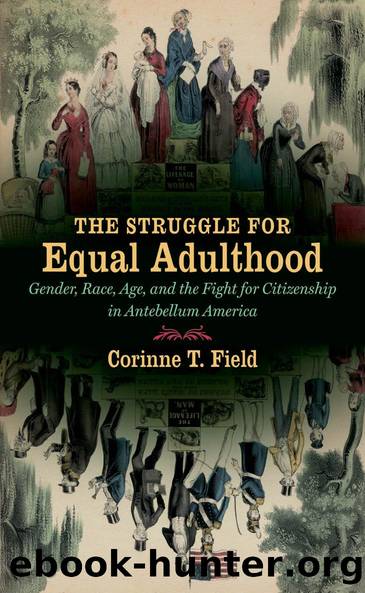The Struggle for Equal Adulthood by Corinne T. Field

Author:Corinne T. Field [Field, Corinne T.]
Language: eng
Format: epub
Tags: Social Science, Women's Studies, Ethnic Studies, American, African American & Black Studies, History, United States, 19th Century
ISBN: 9781469618159
Google: Akz4AwAAQBAJ
Publisher: UNC Press Books
Published: 2014-09-02T05:43:37+00:00
CHAPTER FIVE: COMPETING MEASURES OF MATURE CITIZENSHIP
During Reconstruction, Radical Republicans forever altered the political significance of age twenty-one by pushing for the enfranchisement of all men without regard to race. The Fourteenth Amendment to the Constitution (passed by Congress in June 1866 and ratified in July 1868) placed the power of the federal government behind the idea that males normally made a transition to full citizenship at age twenty-one, while females did not. The final wording of section 2, which introduced the word âmaleâ and age twenty-one into the Constitution for the first time, reduced congressional representation for any state that denied the right to vote to âthe male inhabitants of such State, being twenty-one years of age . . . in the proportion which the number of such male citizens shall bear to the whole number of male citizens twenty-one years of age in such State.â1 The logic of the amendment thus deliberately and decisively rendered adult males the only population that counted for purposes of political representation and rewrote the nationâs fundamental law so as to clarify that states had no obligation to extend political rights to women or minors.
Womenâs rights activists responded in different ways to this change. Most regarded the elimination of racial qualifications for the vote as an essential step toward winning equal rights for all adults, but a vocal minority refused to accept any reform that sustained the classification of women with children.2 Three of the activists who had most thoroughly explored the significance of adulthood in the antebellum periodâFrederick Douglass, Elizabeth Cady Stanton, and Frances Harperâtook the lead in articulating divergent views on the political significance of maturity during Reconstruction. Douglass urged his allies in the womenâs rights movement to recognize that while winning equal rights for all adults was the ultimate goal, black men urgently needed the vote to prove their equality with other men and to protect their dependent wives and children.3 Stanton, drawing on a mix of crude racism and cutting-edge sociology, particularly the writings of August Comte, argued that if anyone needed the vote it was the most âintelligentâ and âvirtuousâ women in the nation, and if any adults should be classed with children it was âignorantâ and âdegradedâ men. Stanton invoked a hierarchical âscale of beingâ with multiple metricsâeducational attainment, moral refinement, social status, the progress of civilization, racial difference, and generational standing.4 She relied variously on these different measures of âhigherâ and âlowerâ orders depending on context but always argued that by any criteria that really mattered, manhood suffrage amounted to âexalting the son above the mother.â5
Harper, meanwhile, insisted that the life of Christ provided the only true model of individual development.6 The lesson to be learned from the Bible, she argued, was that the highest stage of human maturity was reached when an individual put aside ambition for wealth or power and instead worked with Christian humility for the good of âall Godâs children.â By this measure, Harper contended, white womenâs rights activists boasting of their
Download
This site does not store any files on its server. We only index and link to content provided by other sites. Please contact the content providers to delete copyright contents if any and email us, we'll remove relevant links or contents immediately.
| United States | Abolition |
| Campaigns & Battlefields | Confederacy |
| Naval Operations | Regimental Histories |
| Women |
In Cold Blood by Truman Capote(3362)
The Innovators: How a Group of Hackers, Geniuses, and Geeks Created the Digital Revolution by Walter Isaacson(3099)
Steve Jobs by Walter Isaacson(2875)
All the President's Men by Carl Bernstein & Bob Woodward(2357)
Lonely Planet New York City by Lonely Planet(2204)
And the Band Played On by Randy Shilts(2178)
The Room Where It Happened by John Bolton;(2140)
The Poisoner's Handbook by Deborah Blum(2123)
The Innovators by Walter Isaacson(2087)
The Murder of Marilyn Monroe by Jay Margolis(2085)
Lincoln by David Herbert Donald(1975)
A Colony in a Nation by Chris Hayes(1912)
Being George Washington by Beck Glenn(1862)
Under the Banner of Heaven: A Story of Violent Faith by Jon Krakauer(1778)
Amelia Earhart by Doris L. Rich(1680)
The Unsettlers by Mark Sundeen(1673)
Dirt by Bill Buford(1659)
Birdmen by Lawrence Goldstone(1650)
Zeitoun by Dave Eggers(1630)
